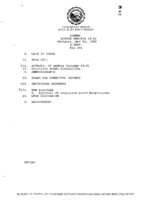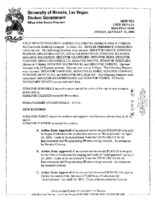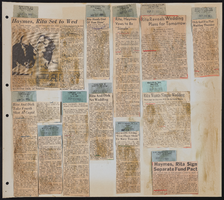Search the Special Collections and Archives Portal
Search Results

Transcript of interview with Mary Ellen Osborn Lake by Fred Wilson, February 18, 1951
Date
Archival Collection
Description
On February 18, 1951, Fred Wilson interviewed Mary Ellen Osborn Lake (born 1870 in Mercer County, Missouri) and her son, Thomas Lake (born 1889 in Missouri). Wilson first asked Mary Ellen questions about when she first arrived in Las Vegas, Nevada in 1904. Much of the relatively brief interview involved questions related to the first Methodist churches in Las Vegas and the Lakes’ involvement and recollections of the locations and members of the church community.
Text

Transcript of interview with Judy Lee (Johnson) Jones by Claytee D. White, February 22, 2007
Date
Archival Collection
Description
In the 1950s and 1960s, the Copa Room at the Sands Hotel and Casino featured glamorous showgirls. For a few years, the Houston Chronicle sponsored a contest that added the Texas Copa Girls to the line. In 1958, one of the winners was 17-year-old Judith Lee Johnson. For the "wild" but "naive" Judy, the experience was a period of funfilled freedom, followed by relentless encouragement of others to attend college, which she reluctantly did. To her surprise, she embraced the college life, took her studies seriously, and received an education degree. She also became Miss Houston. Four years later she returned to Las Vegas and the Sands. As she stepped into her role as a showgirl this second time, she was no longer the newbie. She experiences the lifestyle with more maturity. She talks about the celebrities she met, the lasting friendships she formed, performing in the Elvis movie Viva Las Vegas, and her trip around the world, a trip that included her personal dream of going to Paris. Judy shares details of her family heritage and she wonders to what extent she might have been living her mother's dream. Though her love of performance and theatre is keen, Judy channeled her passions into a 29-year career as an educator. She married a Marine in 1965, raised their children, moved with his career. She and her husband, Walter F. Jones, live in Virginia.
Text

Lupe Avelar oral history interview: transcript
Date
Archival Collection
Description
Oral history interview with Lupe Avelar conducted by Marcela Rodriguez-Campo and Maribel Estrada Calderón for the Latinx Voices of Southern Nevada Oral History Project. Lupe Avelar describes her life growing up in Durango, Mexico on a family farm and her immigration to New Mexico as a teen with her brother before returning back to Mexico. Lupe talks about her marriage to Eladio Avelar and how the couple eventually moved to California as well as her circumstances of moving to Las Vegas. Subjects discussed include: cotton fields; cotton farming.
Text

Meeting minutes for Consolidated Student Senate University of Nevada, Las Vegas, January 28, 2002
Date
Archival Collection
Description
Text

Pablo Macias oral history interview: transcript
Date
Archival Collection
Description
Oral history interview with Pablo Macias conducted by Elsa Lopez, Monserrath Hernandez, and Claytee D. White on December 07, 2019 for the Latinx Voices of Southern Nevada Oral History Project. Pablo Macias was rasied in the small town of Carlin outside of Elko, Nevada. His father and mother met in Ogden, Utah where his father was working on railroad in Nevada and Utah. After finishing high school, he got a job at Elko Blacksmith Shop, where he learned to weld. After attending Northern Nevada Community College, he enrolled and graduated from UNR. After graduation, he took a position at Von Tobel Middle School in 1990 teaching Spanish and Physical Education. While working as a Spanish teacher in Rancho High School he enrolled in a Master's program at Nova Southeastern University, completing the program in education administration. He currently serves as the Associate Director of Corporate Work Study Program Operations for Cristo Rey St. Viator College Preparatory High School. Subjects discussed include: Education, Rancho High School, Von Tobel Middle School, Barrick Mining, and Cristo Rey.
Text

Transcript of interview with Pauleen Foutz by Don Scott Kaye, February 25, 1980
Date
Archival Collection
Description
Text

Transcipt of interview with John M. Beville by George Braver, March 11, 1981
Date
Archival Collection
Description
Text

Meeting minutes for Consolidated Student Senate University of Nevada, Las Vegas, May 11, 1989
Date
Archival Collection
Description
Text

Meeting minutes for Consolidated Student Senate, University of Nevada, Las Vegas, January 09, 2004
Date
Archival Collection
Description
Text

